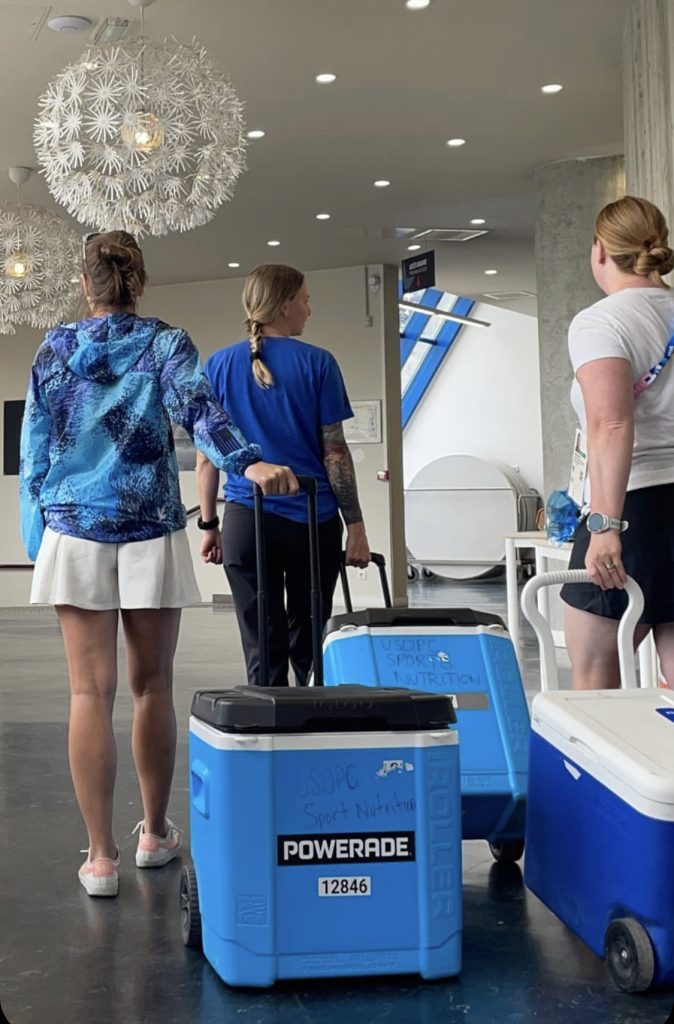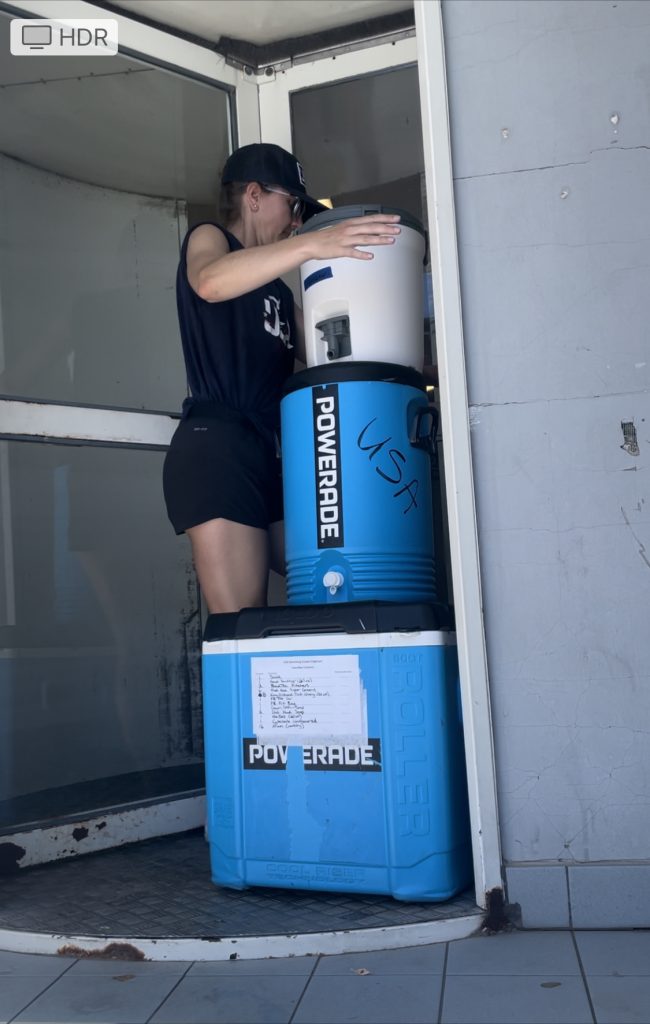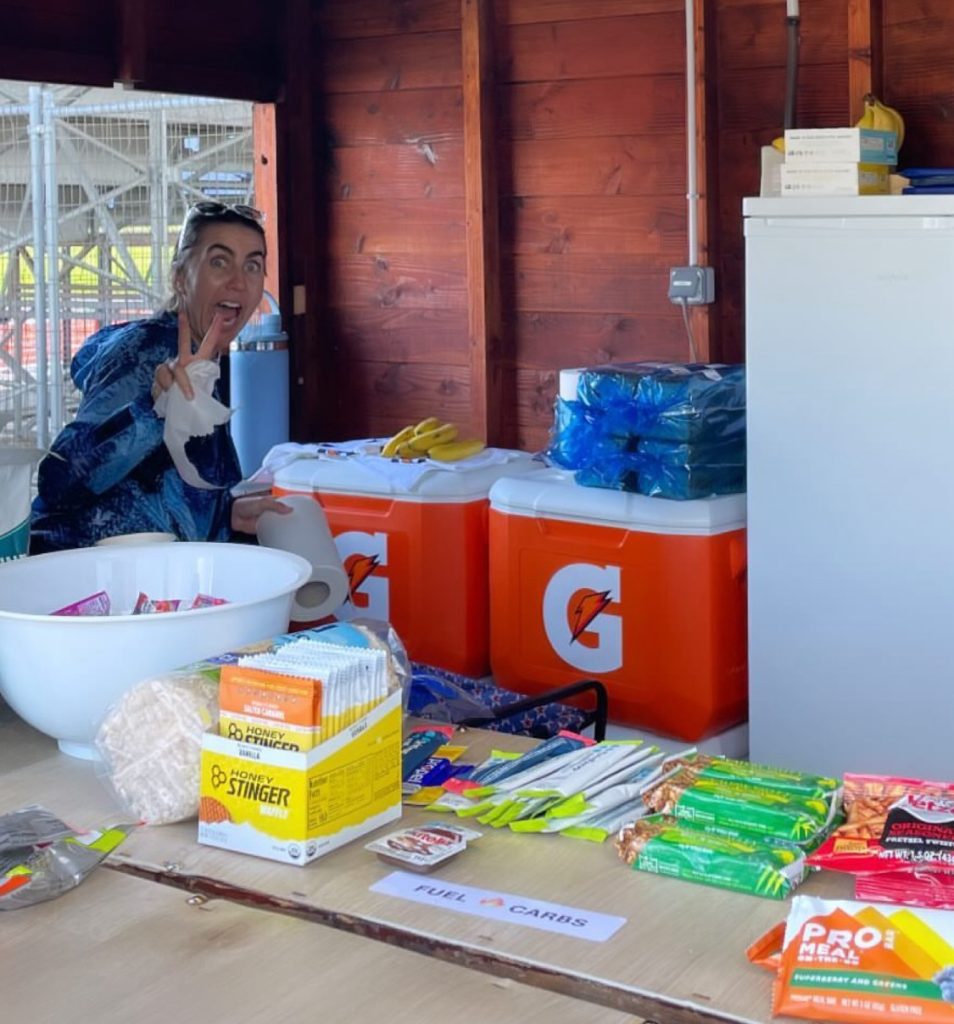PARIS – While our country’s eyes are on the nearly 600 American athletes competing at the 2024 Paris Olympics, scores of personnel are working tirelessly behind the scenes to support them. Former Coronadan Mackenzie White is one of those people.
White, a Certified Specialist in Sports Dietetics, is in Paris supporting USA Swimming and USA Track and Field (USATF). She traveled to Croatia with USA Swimming for the team’s training in early July and arrived in Paris on July 22. Previously, White supported USA Swimming and USATF in six World Championships and the Tokyo Olympic Games.
Serving as a dietitian immediately before and during competitions is different from the work of a dietitian in the months and years leading up to the Games. Because the athletes come to the Games aware of their nutritional needs, a dietitian’s job during competitions is to make sure that the appropriate food and drinks are readily available when needed. “During the games, we are just basically putting out fires,” said White, “making sure athletes have what they need, making sure they’re getting food.”

Staff members including the dietitians, sports medicine personnel, sports psychologists, and chefs at dining services communicate regularly. “We’re always checking in with everyone to make sure we are communicating,” said White. She works with two other dietitians to support USA Swimming and USATF. Much of the team’s work involves logistics that can include anything from transporting snacks and drinks to shopping and restocking to making sure that recovery snacks and fluids are where the athletes need them. “We do a lot of random things that people wouldn’t expect,” said White. “We load and unload pallets of food and snacks and recovery items. … It is 24/7, we are always on call.”
Ever since the dietitians arrived in Paris, they have been up early every morning to plan for the varied practice (and now, competition) times and locations of the athletes. The staff members plan for transporting recovery snacks and other nutritional items so that they are available for the athletes. Paying attention to schedules and competition locations is key. The afternoon is often spent restocking and once again moving food and drinks from one venue to another to be in place for the afternoon and evening practice sessions. Then, late in the evening, the staff members begin their logistics planning for the next day.

Serving in the role of dietitian requires quick problem-solving skills and adaptability as no two days are the same. The staff members also need to know about and regularly communicate athletes’ food allergies or specific food needs. They problem solve if there’s something that food-service providers or the Village Dining Hall cannot provide. “I really enjoy this type of situation with the job, because it is very active,” said White. “We’re never sitting down. We’re never sitting still. There’s always something to be done, or someone who needs help or assistance with something.”
When comparing the swimmers to the track and field athletes, White shared that swimmers tend to have larger appetites, although it depends on the event and the athlete. In any case, the staff members always provide a variety of recovery beverages, pre- and post-snacks, bars, shakes, and oral rehydration solutions that provide athletes with electrolytes, minerals and vitamins that they lose during exercise.
White described her role as being one of the “team behind the team,” helping to make athletes feel as comfortable as possible in extremely stressful conditions. “Team USA is super inspiring,” White said. She added that the athletes often express their gratitude for the support staff, which adds to White’s appreciation for working with USA Swimming and USATF. “It’s extremely, extremely rewarding to work in an Olympic Games,” White said.

Imagining her role, an observer might think that White has opportunities to see the athletes compete, but she laughed at that notion. “Everyone expects us as staff to be watching, to be in the stands,” she said. “We’re all working while the athletes are competing, because there may be one athlete competing, but there’s the rest of the team waiting to compete or who just finished.”
Learn about the athletes’ nutritional needs at this U.S. Department of Agriculture site. Next time you are watching the Olympics, see if you can spot the team behind the team!




